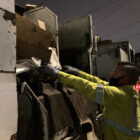Fair treatment of domestic workers rose to the top of the agenda of San Francisco leaders this week, unleashing an emotional response from workers who said their contributions to society were under-valued.
“Domestic workers are the backbone of the economy, working to ensure the health of others and freeing others to work in the workforce,” said Supervisor Eric Mar. “But they usually work alone, behind closed doors and out of the public eye, leaving them vulnerable to abuse, exploitation and unable to advocate for better working conditions.”
Mar is calling for reform at the state level and above. Currently, domestic workers are excluded from the National Labor Relations Act, and from many antidiscrimination laws.
Mar, along with supervisors David Campos, John Avalos and David Chiu, introduced a resolution in advance of the International Labor Organization conference, in Geneva, from June 1 to 16. It is the first time that both employees and employers will be represented together at the conference.
Juana Flores, of National Domestic Worker Alliance and Mujeres Unidas y Activas, will represent employees in Geneva. By relying on a coalition of support at a national and international level, she said she goes to the conference with an agenda that includes better sleep and overtime compensation.
Jill Shenker, a national organizer for the National Domestic Workers Alliance, said many domestic workers are, in essence, slaves. Some may be kept against their will or be forced to work in bad conditions for many hours without pay.
Domestic workers experience verbal abuse or even violence from their employers, Shenker said. She noted that part of the problem is that work has been devalued.
About a dozen women spoke in support of the resolution. Many praised San Francisco as a “sanctuary city,” due to its high minimum wage and required paid sick leave. Others just asked that their hard work be appreciated.
“I’m proud to be a domestic worker … but I don’t want my daughter to be embarrassed of the work that I do,” said Laura Hernandez, who carried her young child on her shoulder. “This work needs to be recognized.”








